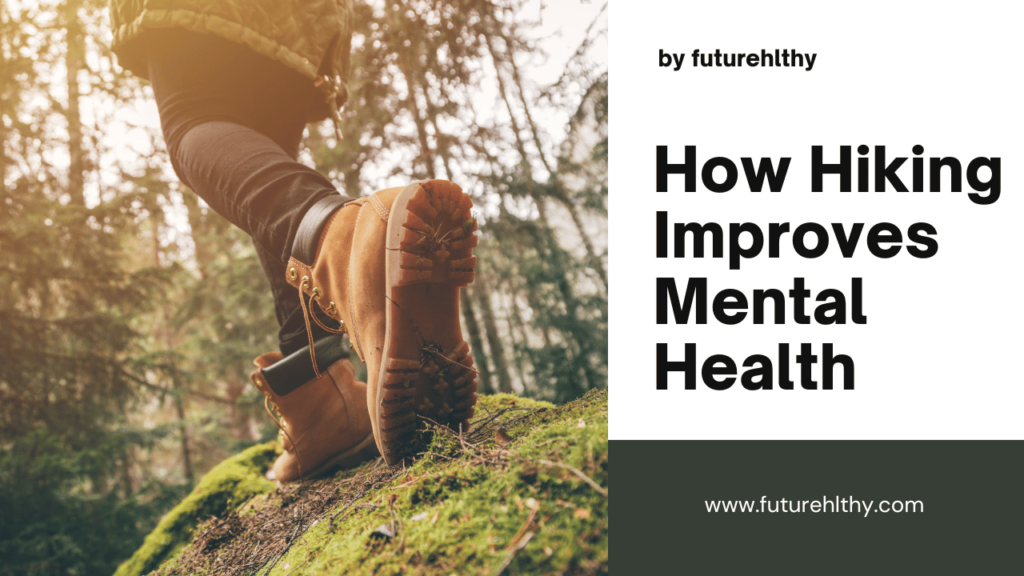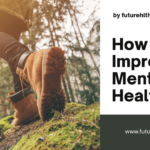How Hiking Improves Mental Health

Hiking to improve mental health isn’t just a way to stay physically fit. It’s also one of the best natural ways to boost your mental well-being. Today, many people struggle with stress, anxiety, and even depression. Hiking offers a simple yet powerful way to feel better. Being in nature and moving your body provides multiple mental health benefits. In this guide, we’ll explain how hiking improves mental health, the science behind it, and share practical tips for getting started.
Table of Contents:
- How Hiking Helps Mental Health
- The Benefits of Hiking for Stress and Anxiety
- Hiking and Clear Thinking: Nature’s Way to Help Focus
- How Hiking Improves Your Brain Chemicals
- How Hiking Eases Depression Symptoms
- The Power of Nature for Mental Wellness
- Why Hiking Is Better than Walking for Your Mind
- Best Hiking Trails to Boost Your Mood
- Tips for Beginners to Start Hiking for Mental Health
- Conclusion: Hiking as a Natural Way to Fight Depression
How Hiking Helps Mental Health
Hiking is a great way to improve your mind. It helps both your body and brain. Studies show that hiking for mental health lowers stress, lifts your mood, and helps you think more clearly. Unlike going to the gym, hiking is different because it connects you with nature.
When you hike, your brain releases serotonin. Serotonin is a chemical that makes you feel happy. As you walk, your brain takes a break from overthinking. Being in nature also helps. It gives your brain a rest from daily worries and stress. Hiking in nature is a great way to refresh both your body and mind.
The Benefits of Hiking for Stress and Anxiety
Stress and anxiety are common problems today. Many people use hiking as a way to reduce these feelings. Fresh air, quiet surroundings, and the steady pace of hiking help lower cortisol. Cortisol is a hormone that causes stress.
When you’re surrounded by nature, your brain calms down. Your mind is no longer focused on daily stressors. Hiking also helps your body and mind work together, making you stay in the present moment. Reaching the top of a hill or finishing a trail gives you a sense of achievement. This can boost your confidence and lower anxiety.
Hiking can also help you sleep better. Sleep is very important for your mood. Hiking three times a week for 30 minutes can make a big difference.
Hiking and Clear Thinking: Nature’s Way to Help Focus
Do you often feel like your mind is foggy? Hiking can help clear your head. The movement, fresh air, and beauty of nature help your brain take a break.
When you’re hiking, your brain switches its focus. You stop worrying about work or daily stress. The calm and quiet of nature help you think more clearly. Hiking lets your brain rest, which improves your decision-making skills. A clear mind leads to better ideas and solutions.
How Hiking Improves Your Brain Chemicals
Exercise changes the chemicals in your brain. Hiking is a form of exercise that releases important chemicals like serotonin and dopamine. These chemicals make you feel good and help control your mood.
Hiking also improves blood flow to your brain. This can help your memory and focus. Regular hikes can keep your brain sharp and help you manage your emotions. Hiking’s positive effect on brain chemicals can ease symptoms of stress and depression.
How Hiking Eases Depression Symptoms
Depression is a serious condition that affects many people. Hiking for depression relief is a natural way to help. Walking in the sun, breathing fresh air, and being active all work together to lift your mood.
Sunlight gives your body Vitamin D, which helps control mood. The physical activity involved in hiking also releases endorphins. Endorphins are the body’s natural mood boosters. This creates a natural way to fight depression.
Hiking can also help you practice mindfulness. While hiking, you focus on your surroundings. This takes your mind off negative thoughts. Studies show that hiking in nature can help stop harmful, repetitive thinking. Even short hikes can help ease depression.
The Power of Nature for Mental Wellness
Nature plays a huge role in boosting mental wellness. Being in green spaces like forests or parks can lower the risk of mental health issues. This is why hiking in natural places is so helpful.
Nature helps reduce sensory overload. The calm sights and sounds of nature help your brain relax. Unlike the busy city, nature promotes peace and mindfulness. This leads to lower stress, anxiety, and even symptoms of PTSD.
Spending time outside also helps you feel more connected to the world. Many people feel more grounded and balanced when they hike in nature. This sense of connection helps with emotional well-being.
Why Hiking Is Better than Walking for Your Mind
While walking is good for your health, hiking for mental health offers more benefits. The key difference is the environment and difficulty level. Hiking takes you out of the city and into nature, which has greater mental benefits.
Hiking challenges both your body and mind. Uneven paths and inclines make your brain work harder, which boosts focus. The quiet, peaceful settings of hiking trails also offer deeper relaxation. These factors make hiking a better choice for improving your mental health.
Best Hiking Trails to Boost Your Mood
Picking the right trail is important when hiking for mental health. Here are some of the best hiking trails for mental wellness:
- John Muir Trail, USA – This trail offers beautiful views of the mountains, perfect for mental peace.
- Laugavegur Trail, Iceland – With its glaciers and waterfalls, this trail is ideal for stress relief.
- West Highland Way, Scotland – A rugged trail with calming views to help clear your mind.
- Milford Track, New Zealand – Lush greenery and waterfalls make this a great place to refresh your mind and body.
Exploring new trails can boost your mood and help you feel re-energized.
Tips for Beginners to Start Hiking for Mental Health
If you’re new to hiking, don’t worry. It’s easy to get started, and you don’t need much gear. Here are some tips for beginners who want to hike for mental health:
- Start small: Choose shorter, easier hikes at first. As you build confidence, try longer or more difficult trails.
- Stay hydrated: Drink plenty of water to keep your body and mind working well.
- Wear good shoes: Comfortable shoes are key to enjoying your hike and avoiding injury.
- Focus on mindfulness: Pay attention to your surroundings. Deep breaths and listening to nature can help calm your mind.
- Hike with a friend: If you’re nervous, bring a friend along. It makes the experience more enjoyable and safe.
Hiking is easy to adapt to your level, making it perfect for improving your mental well-being.
Conclusion: Hiking as a Natural Way to Fight Depression
Hiking is more than exercise. It’s a natural way to improve your mental health. By combining physical movement, fresh air, and nature, hiking helps reduce stress, anxiety, and depression. Whether you’re looking to relax, lift your mood, or find clarity, hiking can help.
Start making hiking part of your routine, and enjoy both the mental and physical health benefits. Next time you feel stressed or overwhelmed, head to a trail and experience how hiking can boost your mood and clear your mind.
see more : 10 Importance of Mental Health

Alex Morgan
Alex Morgan focuses on stress management, mindfulness, and emotional well-being. Their content provides approachable, supportive guidance for everyday mental health.



